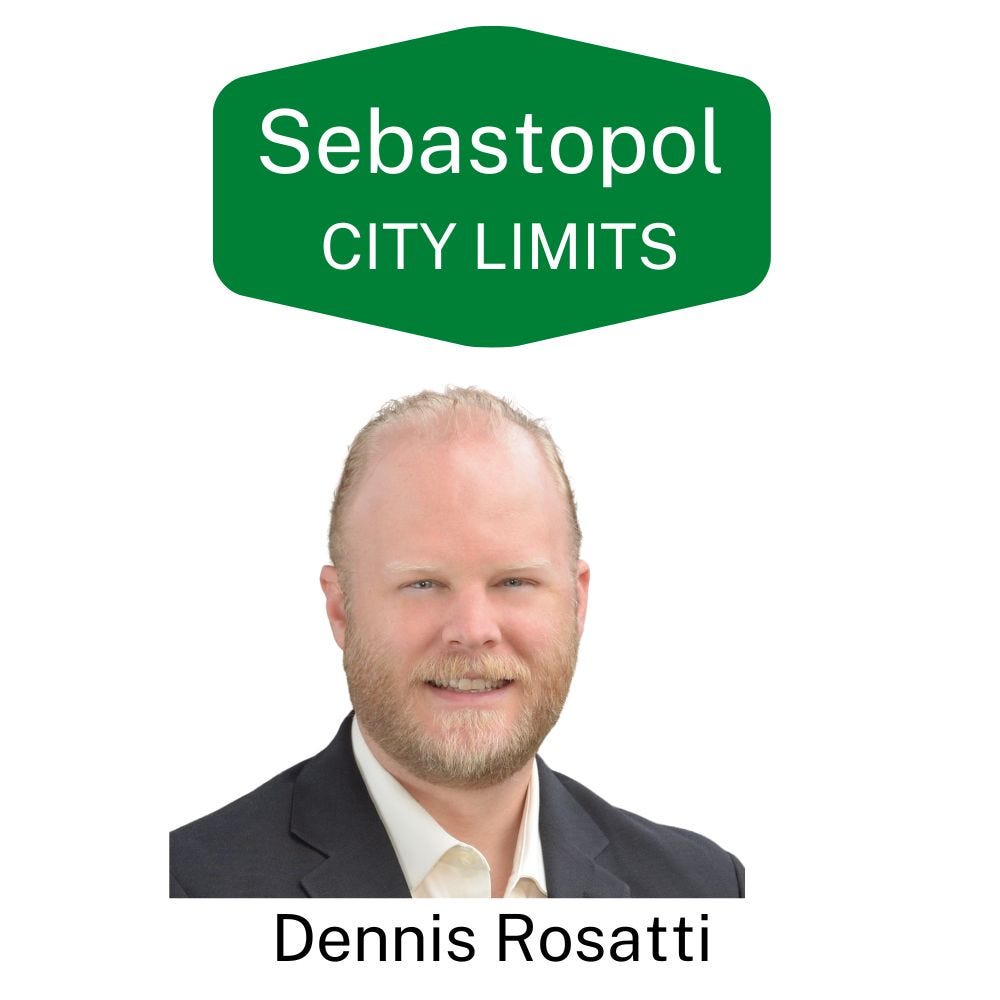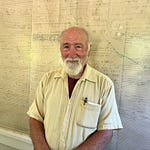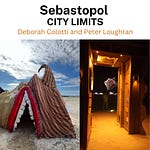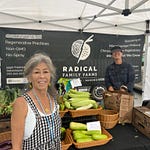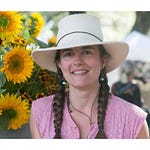In this conversation, we talk to a local political consultant, Dennis Rosatti, about the election results, which are still coming in. Dennis lives in Sebastopol but did not work for any of the City Council or School Board candidates in Sebastopol in this year’s elections. He shares his observations on the City Council election, addressing what seemed to matter in a close race and touching on voter turnout, the role of under voting (voting for less than three candidates) or bullet-voting, the value of endorsements as well as door-to-door canvasing.
We started recording this session at 1:30pm on Friday and at 1:31pm, a new batch of 40,000 votes showed up on the Sonoma County Registrar of Voters website, which Dennis had been expecting. Even with fresh vote totals, the ranking of the candidates for City Council did not change. Only 407 votes separate first from last, and 232 votes separate third and fourth place.
The winners of the school board races in Sebastopol did not change with the additional votes. According to Dennis, in his communication with the Registrar’s office, about 20,000 votes remain to be counted. These results are not final or official but we are getting closer and closer to the end of a close race.
When you see that small a margin of victory and defeat, it tells me that things aren't clear, in terms of where folks are at and where the city's going.
Transcript
This transcript is lightly edited for clarity.
Dale: I'm joined today by my colleague Laura Hagar Rush. And we are talking to Dennis Rosatti of Rosatti Consulting about the election. As we started our conversation today, a new batch of votes came in, showing up on the county registrar site, so we'll be talking about that. But welcome, Denny. Thanks for talking to us.
Dennis: Absolutely. Thanks for inviting me to talk.
Dale: Could you just give us, in a nutshell, your background and the type of work you do?
Dennis: Sure. I do political consulting and public affairs work in Sonoma County in the north. I've been doing this as a full-time gig for about eight years. Started my business about 12 years ago. And prior to that I was the executive director for Sonoma County Conservation Action. And so I cut my teeth on politics in the county. And I did that work for about 15 years in Sonoma County at the grassroots level.
Dale: Just to be explicit, were you involved in managing any of the campaigns in the Sebastopol City Council or the school board?
Dennis: I was not, no. I did not work on any campaigns directly in Sebastopol or West County this cycle. I did have a couple campaigns in Windsor. I had a school board campaign in Piner Olivet Union school district. And a couple other campaigns around the North Bay, but not in Sebastopol.
Dale: Why don't you just tell us about this recent update of votes.
Dennis: We finally got another 40,000 votes that came in from the county registrar of voters from their last update this past Tuesday, which was the 15th. We were told there was about 60,000 votes left to count approximately. It appears that they added about another 40,000 to the tally. So that tells me we've got a diminishing number left obviously, and usually the ones that are left at this point are ones that come in the mail.
In other words, they've received them after election day, but they are postmarked by election day. And/or they are provisionals where folks had a spoiled ballot, they screwed up on their ballot and had to get a new one. They late same-day registered and voted provisionally. Those ballots are always the most difficult for them to verify and they take the most time with them in order to make sure that the sanctity of our process is kept intact.
Dale: So what do the current numbers tell us? Anything different? Anything's changed since the Tuesday.
Dennis: As far as I can tell now without diving too deep in, as you said literally this came out 10 minutes ago. It appears that we have a similar trend to what we've been seeing. And we haven't had any movement amongst our candidates here in the city of Sebastopol. In terms of positioning, we've still got Steven Zollman, who is in the lead with 1,843 votes; Jill McLewis in second place at 1800, and then Sandra Maurer at 1744 votes.
And those are the top three that would advance if this were the final. And then we have two (candidates) trailing, and that would be Oliver Dick at 1,512 votes and Dennis Colthurst with 1,436 volts. The gap has gotten a little bit bigger between the top and the bottom. We've got 331 votes separating them currently. (Correction: it is 407).
And then the gap, perhaps the more relevant gap here, because it doesn't really matter what place you're in as long as you're top three — the gap between third place and fourth place is about 232 votes.
If you look at the votes from 2018, which is the most recent non-presidential city council election, those votes tallied in at 2478 for third place and 2869 for first place. However, you had a situation where the voter turnout was 83%. This is the election right after Trump got elected. Typically you see a dip in the non-presidential years in terms of voter turnout. And in fact we did see a dip, but it was not a very big dip. 83.5% is a very high voter turnout for any election let alone a gubernatorial. The presidential years by comparison, we see typically in Sonoma County, 90 to 93%. We're one of the top in the state always. Us, Marin County and Alpine County. Interestingly enough, there's only about 300 voters in Alpine County. But they all vote.
Dale: So what's the turnout for this year looking like?
Dennis: Right now we're sitting at 60% with this current update. And when you add in about another 20,000 votes, if that's what's out there, which is what the registrar voters are telling us you're going to end up around 65% countywide. Sebastopol will track a little better than that, as we always do. But I don't expect it to be more than a few percentage points higher.
Dale: So it's a bit down from the last two elections then, right?
Dennis: Yeah. I can see these numbers climbing another hundred or 200 votes overall, but I don't think we're gonna get to 2,600, in other words, on any of our people that were running.
I think there's a number of reasons for that. One is, again, it's a lower turnout election in general, so you're going to have lower votes. Two, you have five people running that were relatively speaking unknowns in the city politics. I don't mean that in a disparaging way toward the candidates at all.
It's just they haven't been on a ballot for the city council before. They're newcomers. We had three long-tenured city council members choose not to run this cycle, which left these three open spots and we had five people run that had different levels of service given to the city, the community, but not necessarily name placement on the ballot.
I believe the only person who did have that was Dennis Colthurst, who was on the Palm Drive Board, and he is currently in last place. I personally, and I'm sure many of us might ask the question, does that association with Palm Drive actually hurt him more than help him? Given what happened with Palm Drive, it's no longer really a functioning agency and we're still paying property taxes there.
Dale: It does say people might remember those things.
Laura: And his campaign played it down.
Dale: There was some discussion about under voting that that there was a strategy to encourage people to only vote for candidates in two out of the three rather than three. And of course this is in the context of a group running as a block Oliver Dick, Jill McLewis and Dennis Colthurst.
Dennis: I can't think of any in recent history that ran quite as unified as those three had. I can't think of any examples in that regard. I know that oftentimes allegiances happen and there's common supporters and you often see certain signs together in certain properties and other signs for the other opposition in other properties.
But I don't recall such a coordinated campaign. I'm an outsider looking into this thing, but I am in the business and the direct mail that was sent out by the three that ran as a slate.
We got three different pieces from, McLewis, Colthurst and Dick. And it appeared to me that the graphic design was done by the same person or the same firm. Very similar characteristics. All had little vote by November 8th, little stars in the corners of the mail. The backside had the same kind of spacing and layout design. For the most part, the message was very similar, if not exactly the same on the pieces in terms of the top three to five issues that they listed. Some very subtle differences, but for the most part, looked the same.
They were all sent from the same presorted first class mail, and they all came out of the same outfit. So it appeared that they were running pretty coordinated. I think maybe you had some pushback from voters in Sebastopol. Maybe they didn't like that.
Hard to say, exactly, given there's not that big of a spread between any one candidate or the other. But the two that appeared to be advancing, that were on the other side, Zollman and Maurer did not have the same looking materials, same look and feel to their materials.
They did have a few common endorsements with the Sierra Club and with Sebastopol Tomorrow. But besides that, they seemed to not have a whole lot of the same strategy and planning. As far as under voting goes or withholding the third vote. Again, I don't know if you can really tell by the numbers that happened but I did hear that kind of buzz around town partly as a knee-jerk reaction, I think, to the slate, and folks being concerned about the slate getting in and all of a sudden having majority on the council. But I would guess that a lot of folks chose to place their third vote and maybe they chose the woman, and that's why you see Jill. Maybe they liked her profile more than the other two.
Laura: What I've noticed talking to progressive political watchers is there was a lot of talk that like, yay, the strategy for encouraging people to vote for two people was what won this game. And they pointed to, I think it's, was it a roughly 1500? -- that's a rough number under votes. But then we looked back at some earlier elections and noticed that there was even more under voting, say in the Diana Rich election. And to me that kind of blew that particular theory out of the water. Sounded nice.
Dennis: Yeah. In that election in 2020, Diana had a 2578 vote margin whereas the nearest competitor Neysa Hinton had 2129 and then Evert Fernandez had 2074.
So they're about four to 500 votes below her vote total. It would appear that perhaps some people just bullet voted. That's what they call it in the political world, bullet voting. But it's also hard to say because there was another person in that, two more people in that race as well. But you do have someone who has a lot more votes than the other two. So when they're five and they're all so close together, I don't know that you can actually say from a political science standpoint that there's evidence of under voting.
Dale: The other thing we've heard from people is they felt they didn't get a lot of information about the candidates. One, they were new, so they didn't have a track record. When they made comments in public, it was pretty neutral.
So is this a contest that's more defined by personality, who you like or who you feel comfortable with than it is about issues?
Dennis: Interestingly enough, and I'll point out that the slate of three had some comments and quotes that indicated to me that they intentionally did not go after community based organization endorsements, whereas the other two did.
I would always advise a person running for city council to take the time to educate yourself on the issues facing the city and the people that are involved in those issues and the organizations involved in those issues, and make a really concentrated effort to reach out to those affinity organizations and those issue interest groups to find out what their issues are, what are the things they're concerned about and court them to help you get elected.
Both Steven and Sandra did those endorsement interviews and went through some of those processes. Those organizations then communicated out to their members and the folks that they know that live within the jurisdiction. And, I think that's worth at least a 100 to 200 votes probably in a very close election.
Dale: So endorsements matter.
Dennis: In a race like this, I think endorsements matter, partly because you have one side saying, we're not gonna do that. And that's a strategy oftentimes used by folks that know they're not going to get endorsements.
So they just say, we're above all that, or whatever. But then you have candidates making comments to your newspaper that I read with some distaste that said, I don't have the time to spend doing that. And to me that's part of the job. You gotta go out there and learn what you're going to be legislating and governing. So for me, as a voter, and I'm only one person, but I look to those types of things. (Endorsements) are not the only thing that helps me make my decision. I also look for folks to come around and knock on my door or to go to an event to see people speak in public or to forums. The only person I saw come to my neighborhood was Sandra.
I do believe the three folks had a meet and greet at one of my neighbor's houses, but I was not able to make it. But I know Sandra did knock on my door and I had a conversation with her when I was out gardening in the front yard one morning, on a Saturday morning.
Dale: So another observation — we looked at the campaign spending. It's not complete yet, but the last time we looked at it, it's fairly low amounts raised overall. Under $10,000 for each candidate. The block each got $4,700 from the Barlow. Interestingly, Zollman is probably the last on that list in terms of how much he raised, and he's the top vote getter. That's contrary to most political formulas.
Dennis: Often it's not how much money you spend, it's how you spend it and having enough money to run a decent race, to get yourself some signs and some name visibility is important.
Deficits of finances in a town the size of ours, a jurisdiction the size of Sebastopol, can be overcome by a ground game and actually going out and talking to voters and earning the votes.
Dale: I did hear that all the candidates were doing that, but they might not have all had the same coverage.
Dennis: Sure. I may have missed some at home. Usually they leave something behind when they stop by though.
Laura: So I'm interested in how you think this election, what did it say about the power dynamics within Sebastopol? There's the whole question of the the old guard versus the new guard. There was a lot of discussion about that, but it seemed hard to tell who was who in this game under those definitions.
Dennis: Maybe you can describe, could you explain a little more what you're ...
Laura: Absolutely. So was this just old Sebastopol versus new Sebastopol, that sort of demographic split that we're used to in town or were we seeing something else?
Dennis: Yeah, I'm not sure. I'm not sure who old and new is anymore. We are the oldest voting jurisdiction in Sonoma County by our population. We have more folks over the age of 65 than any other city by percentage of population.
So you know, that new guard that you might be referring to that came in the nineties or so I think is part of the old guard, right?
Dale: There's the old old guard and there's the old guard, and then there's the new guard
Dennis: I know some of the names and some of the personalities. I'm not sure I want to invoke them here in this forum. But I have a lot of respect for folks on both sides of that spectrum, and I think it's important to have a healthy debate in our town. I personally, when I see the vote spread here being only 332 votes, I think it was that we said that they're separated by, when you see that small a margin of victory and defeat, it tells me that things aren't clear, in terms of where folks are at and where the city's going. I think you had candidates searching for issues. I think the city's been in a pretty good place in general.
Of course, we have issues just like any other place with housing, with homelessness, cost of living, our fire department is a big issue. I thought that would actually play more than it did in the election. It was brought up and it was discussed, but it seemed like every candidate had pretty much the same or a similar answer to that one. And I thought it would be a little more of a heavy issue. But anyways, my point was I think, things have been in a fairly good place by a council that's been pretty attentive to the needs of the citizens and the residents. You had a vacuum of folks of leadership, of folks stepping out.
I was hearing from people up until literally the day to file that they were considering putting their hat in the ring. But there was a lot of hesitation because what does this mean? “What does it do? I haven't been involved before.” I think we're gonna see some folks in the next couple of campaign cycles up here that might be new names, new faces, maybe a little younger that might be interested.
As far as the differences between that old school and the new school, if you will, I'm not so sure they're so far apart right now.
Dale: But as much as Sebastopol could have a progressive and a conservative swing, there did feel like one group was running with a more conservative stance.
Dennis: The three were the more conservative and the two were the more liberal progressive. The two that were more progressive went out and got the Sierra Club endorsement and Sebastopol Tomorrow. I know one of them had Sonoma County Conservation Action; the other one had a Democratic party and the North Bay Labor Council, and those folks communicated to their organizations and their people, and I think that swung it.
Dale: The other race that went on, and I don't know if you looked at it much, but it was the. West County Union High School district race, which is given some of the history here, it's a pretty contentious race. Ramirez's won handily over the incumbent 56% to 43%.
Dennis: I'm just looking at that now from the new update.
Laura: And we should point out course that Dennis' wife was on the board. He's married to Kelly Noe. So you have the inside view of this?
Dennis: I do. And I perhaps have a view that's not totally able to be separated from my bias. You're gonna have a low turnout in that election too, in general, compared to the last couple cycles.
Dale: Really.
Dennis: Debbie Ramirez was elected to the Sebastopol Union School Board in the past. I think more than once. I could be wrong about that. She's got a lot of network here in town. I saw a lot of yard signs out there for her. I saw evidence that she was doing text banking, directly reaching out to voters in that way. I didn't see mail from either candidate, direct mail. I do know that the Forestville, Lower River and El Molino sections of the district have been very unhappy with the board in general.
I didn't see a whole lot of campaign from Patrick, the opponent or the appointed incumbent, if you will. I did see some signs out there of his, I heard a bunch of them had gotten stolen. I didn't see a whole lot of other campaign activity from him, so I don't know..
Dale: Okay. Did any of these candidates do anything interesting online to campaign. You mentioned text banking. (Like phone banks only using SMS texts)
Dennis: Debbie did text banking. I didn't see a whole lot to be honest. I saw a few folks made Facebook pages which is a standard thing to do, right? And very basic websites.
But I didn't see a whole lot of online advertising, digital ads from any of the city council candidates or the school board. I did see some endorsement posts and what I would call memes created by endorsers, with testimonials and stuff like that from some of the candidates. I didn't even see a whole lot of that, to be honest.
Laura: I'm wondering if you saw anything in these elections locally that echoed what we've been seeing on the national level in terms of tone.
Dennis: The votes are gonna be fake and that sort of thing.
Laura: That would be one thing. Sort of personal attacks. That would be another thing. Okay. I admit I have a dog in this particular fight. Denigration of the press. That would be another thing.
Dennis: Yeah, I didn't see a whole lot of that locally myself. I'll tell you, my race in Windsor that I worked in, there was a lot of very negative campaigning going on by the opposition to my two candidates. Maureen Merrill and Gina Fortino Dixon were my two candidates. My candidates insisted on keeping a positive campaign and not going below the belt. And unfortunately the people we were running against had some supporters who were just very vicious and they basically owned the Facebook and the Nextdoor and the social media sites and it was difficult to undo.
Laura: The role of Nextdoor is interesting. What was your feeling locally here in Sebastopol from what you saw?
Dennis: From a consultant's perspective, I'm not a fan of NextDoor when it comes to campaigning.
Laura: Uhhuh.
Dennis: And that's mostly because there's really no controls there. Anyone can say whatever they want. When they make a title of a post, it just stays there forever and every time someone comments, it just keeps popping up and popping up. So you could get some real bad information happening, which is something that we did see in Windsor.
And it just persists out there because there's no real mechanism to control it or to reel it in. You also get a lot in my experience, which is unfortunately becoming deeper now with NextDoor in elections having run a bunch of ballot measure campaigns recently in West Sonoma County, you get a lot of folks from cross jurisdictions. NextDoor doesn't stop at the city limit.
So to get people from other jurisdictions that happen to be included in that neighborhood group, opining on things that have no bearing on their lives really. So it's very interesting and there's a lot of uninformed opinion out there as well.
I think it does play somewhat of a role, but it does tend be a bit of an echo chamber. Cause you've got 10 or 15 people on one thread and maybe 20 or 30 or 50 other people seeing the thread that's going on.
Dale: There's some core group of people that are really fighting over this and they're carrying that campaign over lots of places, but most people aren't paying attention.
Dennis: And it's the truth. It's sadly it's the state we live in our state of affairs. So to bring up the national issue, I think where that comes into play actually, Laura, is that it distracts people from what's in front of them, which is their local elections. It turns them off or it makes them feel a little more jaded. That division at the national level between the Republicans and the Democrats, I think does trickle down a bit to the local level because it makes us all less eager or less likely perhaps to be willing to engage with each other on a local level because we know that we have disagreements on that national level.
Whereas people that disagree about who's running for president, let's put Trump aside even though we can't do that, but let's put that aside — people can still agree on: Hey, we need to fix our park, or Hey, we need to, pave our streets. Allow some more housing to be built because our kids need a place to live. Or, we have people here that can't afford to live here. How do we create some more affordable housing? We can come together on some of those things and say, let's figure out how to do this, right? We need to, we have to be able to exist here. When you start getting into the bigger meta issues, if you will, that's when things start to come off. And I think we do see a little bit of the deleterious effect downstream at the local level from the national situation.
We also live in a bubble here in Sonoma County in general and Sebastopol, we're in the bubble of the bubble. I think even our conservative neighbors and friends often find distaste with the vitriolic kind of craziness on the national level.
Dale: Thank you for your time today. I really appreciate your thoughts and insights into the election. We'll say it's not over yet, but it is very close to the finish line.
Dennis: Yeah. We're getting a lot closer with 20,000 votes left countywide. You could see a change here in Sebastopol in the top three, but I think it's getting less likely.
Thank you very much for inviting me to come on. I'm happy to talk anytime.
Dale: Appreciate it. Thanks.




